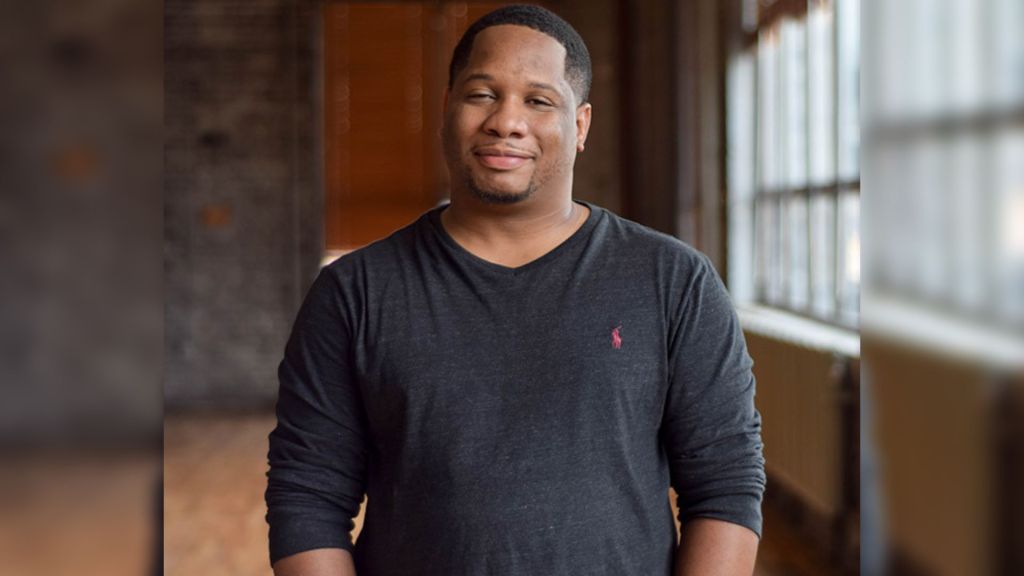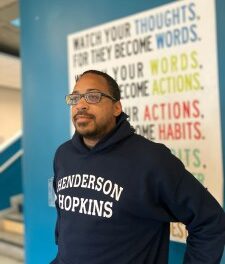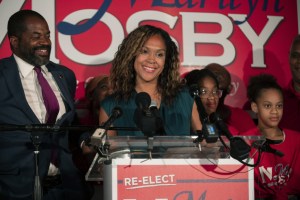By Dayvon Love
Special to the AFRO
What is clear about the killing of Sonya Massey by a police officer in her home? To me, it is the fact that Black people in general—and working-class Black people in particular—are living a life in America that is marked primarily by a disregard for our humanity and the normalization of violence against our community.

Sylvia Wynter, in a letter that she wrote after the Los Angeles riots in 1992, identifies a phrase that LA police officers were using to describe crime scenes where Black people had been killed in poor and working class communities. That phrase was “NHI,” which stands for “No Humans Involved.” This was normally followed by officers having a lack of urgency when it came to figuring out who caused the killing.
Many police officers, particularly those who are policing communities that are not reflective of their own, interact with Black people at our worst. While we meet with law enforcement in emergency situations on a daily basis, far too many are developing deep beliefs and notions of inherent criminality and inferiority, coming to the conclusion that we deserve the oppression and violence that we endure.
I can’t help but think that the relatively cavalier tone in the voice of Sean Grayson as he killed Sonya Massey was a result of his lack of regard for the life of Black people. Instead of a tone typical of someone who just took the life of an innocent person, Grayson’s tone was more reflective of a person who forgot to lock their front door. This societal dehumanization is lodged deeply into the collective American consciousness and reflected in a variety of arenas of civil society:
- Black women have three times the rate of infant mortality of the national average.
- Sexual abuse at the hands law enforcement in cities around the country is rampant and often unchecked (as documented by various pattern and practice investigations by the Department of Justice).
- Black people disproportionately deal with the structural violence of slumlords who expose their tenants to lead or other environmental hazard.
The examples of structural violence that is normalized against our community are endless. The societal disregard for our humanity is a dominant feature in the lived reality among the masses of Black people in America.
Mainstream political leadership does not take seriously the daily structural violence and societal disregard of the humanity of working-class Black people. This is one of the core reasons the masses of Black people are disengaged from the political landscape. At best, our political leaders offer symbolic gestures and bare minimum sustenance policies in the face of the enormous challenges our community faces. It is only when there are highly visible instances of violence against victims – who this society deems to be legitimately innocent – that major figures even pretend to want to do work to address this problem.
Many of the mainstream pundits who are expressing concern about the police killing of Sonya Massey have raised the fact that Congress has failed to pass the George Floyd Justice in Policing Act. This has been their call to action in the wake of this tragedy. However, I have to say that centering this bill as the call to action is another example of the hustle that the Democratic Party is running on Black people.
What Black people need is legislative action that gives us the ability to exercise legitimate institutional power over law enforcement. Law enforcement will only be discouraged from committing violence against our community if we are equipped with the institutional power to levy consequences against officers that harm our people.
What is needed is community control of law enforcement so that the community can punish members of law enforcement who violate people in our community.
Law enforcement policy is the providence of state and local law. There is no federal government policy that can result in community control of law enforcement. Community control requires work in state legislatures, which requires local political power building that goes beyond the “vote blue no matter who” rhetoric that is trotted out every election cycle. This rhetoric has the impact of dumbing down our understanding of how to wield political power that goes beyond the exploitative relationship between Black people and the Democratic Party.
The George Floyd Justice in Policing Act introduces policies that increase the exposure of law enforcement officers who harm people in our community to criminal prosecution. However, independent, community-controlled entities that can conduct independent investigations of allegations of police brutality are needed. Instead, we are offered internal affairs investigations that would allow opportunities to hide evidence needed to hold police accountable. What we need is the ability for the community to punish officers; the policies that are in the George Floyd Justice in Policing Act would not impact the day-to-day violence our community experiences at the hands of law enforcement.
In other words, the George Floyd Justice in Policing Act would be helpful in some of the most extreme instances of police brutality, but our energy would be better spent engaged in local advocacy to pursue community control of law enforcement in order to deal more effectively with the day-to-day violence our community experiences at the hands of police.
Black people need to continue to build power that comes from the bottom up. We should not confuse Black faces in high places with Black Power. Too many of our people are seduced into this trap that benefits the existing structure of the Democratic Party. This is not a plea to entertain the Republican Party, which has an open commitment to White nationalism. This is a plea to shift our relationship to the Democratic Party in such a way that we are not continuing to give them our vote in exchange for a political reality that relegates our community to a perpetual state of disaster management. As opposed to an agenda of Black sovereignty and social transformation that is needed.
The political action that should accompany the consciousness raising about the killing of Sonya Massey is local Black political power building that can get state and local legislatures to pass laws that establish community control of law enforcement. It is only when we have power over law enforcement that they will be genuinely afraid to kill us the way that Sonya Massey was killed.
What is clear about the killing of Sonya Massey by a police officer in her home? To me, it is the fact that Black people in general—and working-class Black people in particular—are living a life in America that is marked primarily by a disregard for our humanity and the normalization of violence against our community.
Sylvia Wynter, in a letter that she wrote after the Los Angeles riots in 1992, identifies a phrase that LA police officers were using to describe crime scenes where Black people had been killed in poor and working class communities. That phrase was “NHI,” which stands for “No Humans Involved.” This was normally followed by officers having a lack of urgency when it came to figuring out who caused the killing.
Many police officers, particularly those who are policing communities that are not reflective of their own, interact with Black people at our worst. While we meet with law enforcement in emergency situations on a daily basis, far too many are developing deep beliefs and notions of inherent criminality and inferiority, coming to the conclusion that we deserve the oppression and violence that we endure.
I can’t help but think that the relatively cavalier tone in the voice of Sean Grayson as he killed Sonya Massey was a result of his lack of regard for the life of Black people. Instead of a tone typical of someone who just took the life of an innocent person, Grayson’s tone was more reflective of a person who forgot to lock their front door. This societal dehumanization is lodged deeply into the collective American consciousness and reflected in a variety of arenas of civil society:
- Black women have three times the rate of infant mortality of the national average.
- Sexual abuse at the hands law enforcement in cities around the country is rampant and often unchecked (as documented by various pattern and practice investigations by the Department of Justice).
- Black people disproportionately deal with the structural violence of slumlords who expose their tenants to lead or other environmental hazard.
The examples of structural violence that is normalized against our community are endless. The societal disregard for our humanity is a dominant feature in the lived reality among the masses of Black people in America.
Mainstream political leadership does not take seriously the daily structural violence and societal disregard of the humanity of working-class Black people. This is one of the core reasons the masses of Black people are disengaged from the political landscape. At best, our political leaders offer symbolic gestures and bare minimum sustenance policies in the face of the enormous challenges our community faces. It is only when there are highly visible instances of violence against victims – who this society deems to be legitimately innocent – that major figures even pretend to want to do work to address this problem.
Many of the mainstream pundits who are expressing concern about the police killing of Sonya Massey have raised the fact that Congress has failed to pass the George Floyd Justice in Policing Act. This has been their call to action in the wake of this tragedy. However, I have to say that centering this bill as the call to action is another example of the hustle that the Democratic Party is running on Black people.
What Black people need is legislative action that gives us the ability to exercise legitimate institutional power over law enforcement. Law enforcement will only be discouraged from committing violence against our community if we are equipped with the institutional power to levy consequences against officers that harm our people.
What is needed is community control of law enforcement so that the community can punish members of law enforcement who violate people in our community.
Law enforcement policy is the providence of state and local law. There is no federal government policy that can result in community control of law enforcement. Community control requires work in state legislatures, which requires local political power building that goes beyond the “vote blue no matter who” rhetoric that is trotted out every election cycle. This rhetoric has the impact of dumbing down our understanding of how to wield political power that goes beyond the exploitative relationship between Black people and the Democratic Party.
The George Floyd Justice in Policing Act introduces policies that increase the exposure of law enforcement officers who harm people in our community to criminal prosecution. However, independent, community-controlled entities that can conduct independent investigations of allegations of police brutality are needed. Instead, we are offered internal affairs investigations that would allow opportunities to hide evidence needed to hold police accountable. What we need is the ability for the community to punish officers; the policies that are in the George Floyd Justice in Policing Act would not impact the day-to-day violence our community experiences at the hands of law enforcement.
In other words, the George Floyd Justice in Policing Act would be helpful in some of the most extreme instances of police brutality, but our energy would be better spent engaged in local advocacy to pursue community control of law enforcement in order to deal more effectively with the day-to-day violence our community experiences at the hands of police.
Black people need to continue to build power that comes from the bottom up. We should not confuse Black faces in high places with Black Power. Too many of our people are seduced into this trap that benefits the existing structure of the Democratic Party. This is not a plea to entertain the Republican Party, which has an open commitment to White nationalism. This is a plea to shift our relationship to the Democratic Party in such a way that we are not continuing to give them our vote in exchange for a political reality that relegates our community to a perpetual state of disaster management. As opposed to an agenda of Black sovereignty and social transformation that is needed.
The political action that should accompany the consciousness raising about the killing of Sonya Massey is local Black political power building that can get state and local legislatures to pass laws that establish community control of law enforcement. It is only when we have power over law enforcement that they will be genuinely afraid to kill us the way that Sonya Massey was killed.
The post Opinion: What the killing of Sonya Massey says about policing and the state of Black people in America appeared first on AFRO American Newspapers.












